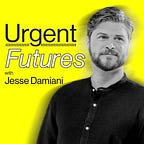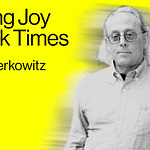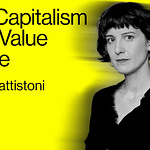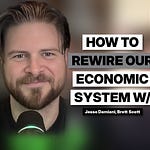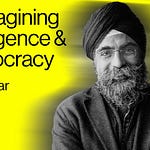Welcome to the Urgent Futures podcast, the show that finds {signals} in the noise. Each week, I sit down with leading thinkers whose research, concepts, and questions clarify the chaos, from culture to the cosmos.
The best way to support the show? 🤓 Pop over to YouTube and Subscribe. You hear it all the time for a reason—nothing will help the channel grow more than that simple click.
My guest this week is Philip V. McHarris.
Philip V. McHarris is an assistant professor in the Frederick Douglass Institute and Department of Black Studies at the University of Rochester. McHarris was a presidential postdoctoral research fellow at Princeton University in the Department of African American Studies and the Ida B. Wells Just Data Lab. He earned his PhD in sociology and African American studies at Yale University. He was named one of the Root’s 100 Most Influential African Americans in 2020. McHarris has appeared on MSNBC, CNN, and PBS and in the New York Times, the Washington Post, the Guardian, and more.
Imagine a world without police.
Not hypothetically—take a moment and imagine that world. What are your first impressions? Lawless cities plunged into chaos? Crime-ridden dystopias? Something something Mad Max? My guest today argues that a world without police is actually a utopia, and has the receipts to prove it.
If you’re skeptical, then I’m excited for you to listen to this conversation with Professor Philip McHarris, author of the recent book Beyond Policing. It’s an astounding read—sprint, don’t walk, to pick up your copy.
Phil believes this world is possible, and makes a persuasive argument for why. At the end of the book, he proposes a speculative future in which the police have been abolished, and shows all the various other improvements society has undergone as a result. But to ultimately get there, he first outlines how the police as an institution came to be, unraveling the notion that it’s a long-standing historical institution and a force for good—demonstrating instead policing’s origins in slave patrols, and how their expanding role in the U.S. and abroad has more often been used to suppress democratic ideals. He weaves in brief anecdotes from his own life as a Black man in America—using himself as an example to demonstrate how law enforcement doesn’t actually protect all Americans, and actively harms certain communities. He also shows how alternative models around the country are already demonstrating far more efficacy in improving safety and security outcomes than the police.
I came away with so much from this book. One data point I find myself coming back to again and again is that in America we spend $100 billion dollars on police every year. That’s billion. With a “b.” And yet if you ask many folks around the country, they won’t say they feel safer. In fact in many cases they’ll report feeling less safe than ever. Facing this data, Phil asks a simple, powerful, and revealing question, which to me is the starting point for considering alternative futures for safety and security: is that $100 billion actually money well spent? Are there other ways we could be spending it?
There are of course critical moral and ethical reasons to abolish the police, and Phil makes them persuasively. But for me, starting within the language of capitalism—money—we begin in a place of basic collective decision-making, which gets away from some of the buzzwords that people latch onto. The police were never designed to be, for example, mental health first responders, so why are we allowing our public funds to be spent this way? And that’s just one example. Whatever we believe about the police is an expression of what we believe about society—and what if our ideas aren’t as good as they could be?
Fortunately, we have books like Beyond Policing to help us understand the past and present of policing, in order to better answer the aforementioned questions as we look to our collective futures.
Some other episodes you might like:
If you’re loving the Urgent Futures podcast…
Please subscribe + leave a review on your preferred podcast platform! Or recommend it to a friend who might like it. All of it help the podcast grow.
Guests on Urgent Futures are experts across art, science, media, technology, philosophy, economics, mathematics, anthropology, and more. We live in complex times; these are the voices who will help you orient to emerging futures.
🎧 Audio versions of the podcast can be found Apple Podcasts, Spotify, or wherever you listen to podcasts. If you like what you hear, please subscribe on those channels!
Support Reality Studies:
NOTE: Thank you for supporting my work by purchasing these products through the links provided. I will only ever share products I actually believe in.
Health & Wellness:
ZBiotics: Right now, get 10% off ZBiotics. Just head over to zbiotics.com and use code JESSEDAMIANI. If you have an evening with drinking and a morning you need to feel fresh, these are a great help.
Genetically engineered by a team of PhD microbiologists, ZBiotics is a probiotic drink that breaks down the byproduct of alcohol responsible for rough mornings after drinking (acetaldehyde).
MUD\WTR: Right now, get 43% off starter packs using this link and the code SUMMER. There’s four different blends to choose from, but my current favorite is :rest. “This is our protest to hustle culture,” they say, and that resonates with me. Not only does it actually help me ramp down to sleep, but since I froth a little milk and make a latte with it, I get the warm cozy feeling of morning coffee at night. (For the evening tea drinkers out there: I’m not saying it’s better, just different!)
Mission Farms CBD: Mission Farms CBD crafts full-spectrum CBD products for specific conditions like sleep, stress, and discomfort, using a combination of CBD and terpenes found in essential oils. I swear by this stuff: I take one of their Marionberry Lemon gummies to end each day.
There’s a lot of junk CBD on the market. All of Mission Farms’s CBD comes from a small farm in Bend, Oregon. They farm the hemp organically, tend every plant by hand, and test for purity four times: the soil, the hemp, the hemp-extract, and the final products. This CBD is designed for wellness and it shows. Go to this link and sign up for emails to get 25% off your first order.
Digital Hygiene:
1Password: Listen, I know from personal experience that password managers don’t make for the most riveting dinner party conversation, but I need to express 3 things: 1) They make your life so much easier—it’s called “1Password” because once you get set up it’s the only password you’ll ever need to remember again. 2) They make your online life so much safer, ensuring that you use unique passwords for every account, stored with a high degree of encryption. 3) They are not nearly as complicated to set up as you think they are! Head over to 1Password using this link for a free trial, and individual plans for less than $3/mo after that.
NordVPN: Right now, get up to 72% off 2-year plans + 3 extra months using this link. Some people tell me that “VPN” brings to mind ideas of hackers and the dark web, but honestly VPNs are just an extremely easy way to stay much safer online. I’ve used NordVPN for the past four years, and appreciate what they offer, including Threat Protection against malware, 24/7 customer support, fast speeds, and more. One account can protect up to 6 devices (phone and computer), and they don’t track or share what you do online. Another benefit: you can always access the content/apps you have at home, wherever in the world you are.
CREDITS: This podcast is edited and produced by Adam Labrie and me, Jesse Damiani. Adam Labrie also directed, shot, and edited the video version of the podcast, which is available on YouTube. The podcast is presented by Reality Studies. If you appreciate the work I’m doing, please subscribe and share it with someone you think would enjoy it.
Find more episodes of Urgent Futures at: youtube.com/@UrgentFutures. Past conversations include Taylor Lorenz, Lia Halloran & Kip Thorne, Cherie Hu, Lisa Messeri, Legacy Russell, and more. Here is another recent episode with artist & creative technologist Taryn Southern:


